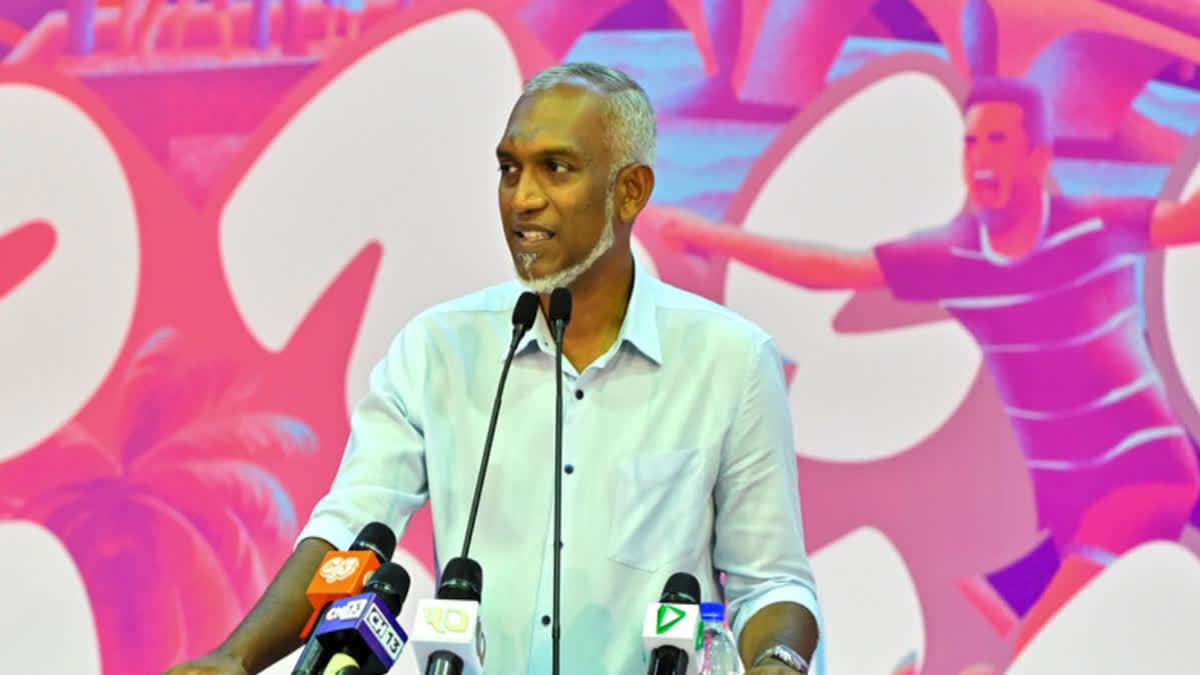New Delhi: With Union Minister for Earth Sciences Kiren Rijiju being deputed to attend new Maldives President Mohamed Muizzu’s inauguration, both India and China will be represented at an equal level according to diplomatic protocol in the event in Male on November 17.
“At the invitation of the President-elect of Maldives H.E. Dr Mohamed Muizzu, Shri Kiren Rijiju, Minister of Earth Sciences will visit Maldives from 16-18 November 2023 to represent India at the inaugural ceremony of the presidency,” the External Affairs Ministry said in a statement on Wednesday.
“Maldives is India’s key maritime neighbour in the Indian Ocean Region (IOR) and occupies a special place in Prime Minister’s vision of ‘SAGAR’ (Security and Growth for All in the Region) and the ‘Neighbourhood First Policy’,” the statement read. “This high-level ministerial representation from India at the inaugural ceremony underscores India’s commitment to further deepen the substantive cooperation and robust people-to-people ties between the two countries.”
The statement comes two days after Beijing announced that State Councilor Shen Yiqin will represent China at the event in Male. Both Rijiju and Shen are not directly involved with handling foreign affairs on behalf of their respective countries. While Rijiju’s mandate in his role as a cabinet minister is to look after atmospheric sciences, ocean science and technology and seismology in an integrated manner, Shen is in charge of human resource affairs, social affairs, civil affairs, women and children affairs and ethnic affairs.
The announcement that Rijiju will be representing India came amidst speculations about whether Prime Minister Narendra Modi will be attending the inauguration ceremony of Muizzu, known for his pro-China stance. In 2018, Modi had attended the inauguration ceremony of former Maldives President Ibrahim Solih who had followed an ‘India First’ foreign policy.
Muizzu, a protégé of former President Abdulla Yameen, known for his pro-China stance, defeated Solih in the presidential runoff held in September-end. Muizzu was the joint candidate of the People’s National Congress (PNC) and the Progressive Party of Maldives (PPM).
Initially, Yameen of the PPM was nominated as the joint candidate of the PNC and the PPM. But since he is serving an 11-year jail term due to a money laundering case, he became ineligible to contest the election. As a result, Muizzu of the PNC was nominated as the joint PNC-PPM candidate.
With Muizzu set to assume office on November 11, India will be keenly watching what policies Male will adopt vis-à-vis New Delhi in terms of economic, defence and security cooperation. As part of New Delhi’s Neighbourhood First Policy, the Maldives is strategically significant to India because of its location in the Indian Ocean. India and Maldives share ethnic, linguistic, cultural, religious and commercial links steeped in antiquity and enjoy close, cordial and multi-dimensional relations.
However, regime instability in the Maldives since 2008 has posed significant challenges to the India-Maldives relationship, particularly in the political and strategic spheres. Ties between India and the Maldives deteriorated significantly when Yameen served as the President between 2013 and 2018. It was only after Solih came to power in 2018 that ties between New Delhi and Male improved.
Defence and security cooperation between India and the Maldives will be another cause of concern for New Delhi. Although India continues to be an important partner of the Maldives, New Delhi cannot afford to be complacent over its position and must remain attentive to the developments in the Maldives. India must play a key role within the Indo-Pacific security space to ensure regional security in South Asia and surrounding maritime boundaries.
China’s strategic footprint in India’s neighbourhood has increased. The Maldives has emerged as an important “pearl” in China’s “String of Pearls” construct in South Asia. During his tenure as President, Yameen had brought in new legislation to lease out islands to China. In the long run, if China plans to convert any of the leased islands into a naval base in the archipelago, then it will have significant security implications for India.
Both Yameen’s PPM and the PNC had fuelled an ‘India Out’ campaign ahead of this year’s presidential election. The ‘India Out’ campaign was aimed at sparking hatred by creating scepticism about India's investments in the Maldives, the defence partnerships between the two sides, and India’s net security provisions.
Following his election, Muizzu had said that expelling all Indian military personnel present in his Indian Ocean archipelago nation would be his first priority. However, Muizzu’s spokesperson Mohamed Firzul Abdullah Khaleel admitted earlier this month that the exact number of Indian military personnel in the Maldives is unknown. At the same time, Muizzu said that he would not be replacing the Indian security personnel with Chinese personnel.
The President-elect’s office had said that invitations for the inauguration ceremony had been extended to other countries and organisations but these were not to any individual official capacity. It was left to the countries to decide who to send. Following this, Rijiju was deputed to represent India. “Rijiju representing India is perfectly okay. After all, he is a cabinet minister,” a source familiar with diplomatic protocol told ETV Bharat.
The Chinese state councillor and the Indian cabinet minister are not directly equivalent positions, as they serve different roles in their respective governments. In India, a cabinet minister is a member of the Union Cabinet, which is the top decision-making body of the government. The state councillor is a member of the State Council, which is the highest executive organ of the Chinese government.
However, it is important to note that diplomatic protocol can vary, and specific arrangements and hierarchies may be agreed upon between countries based on their bilateral relations.
Also read:



